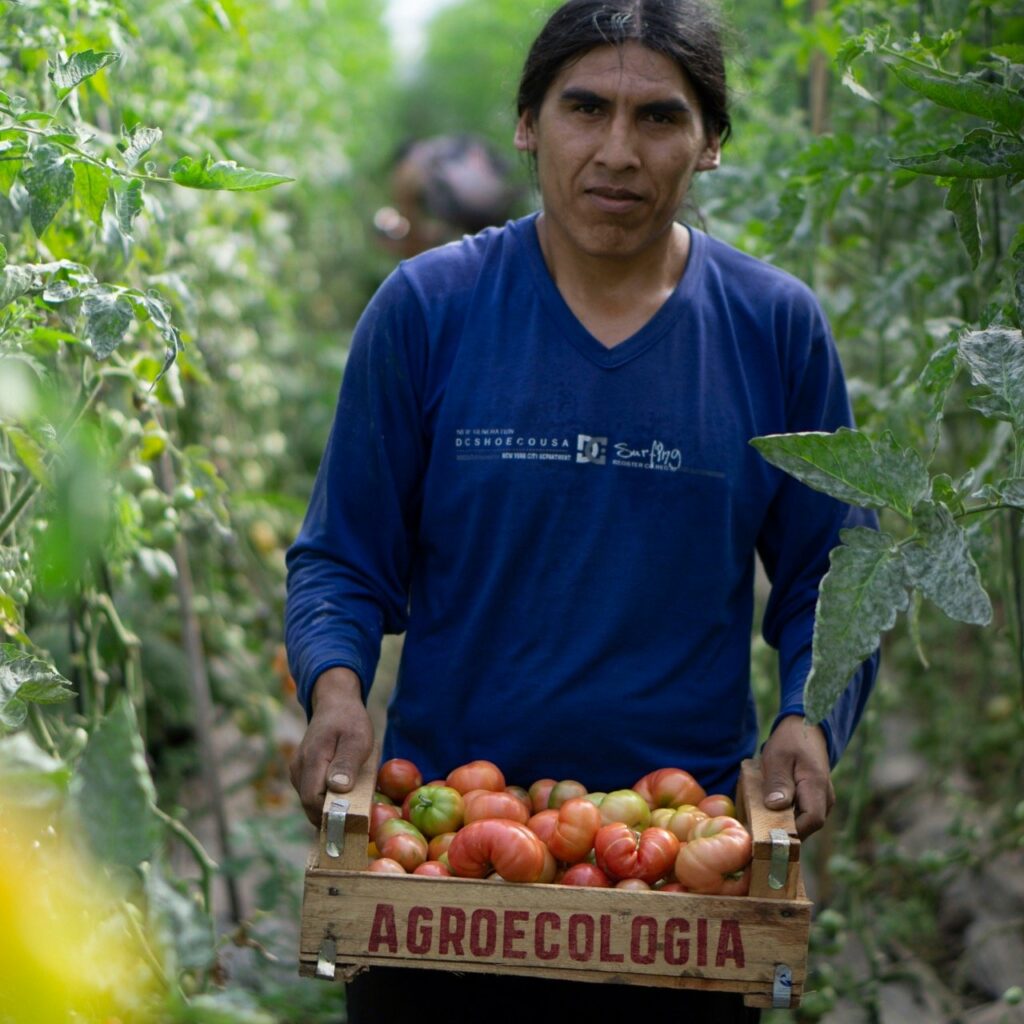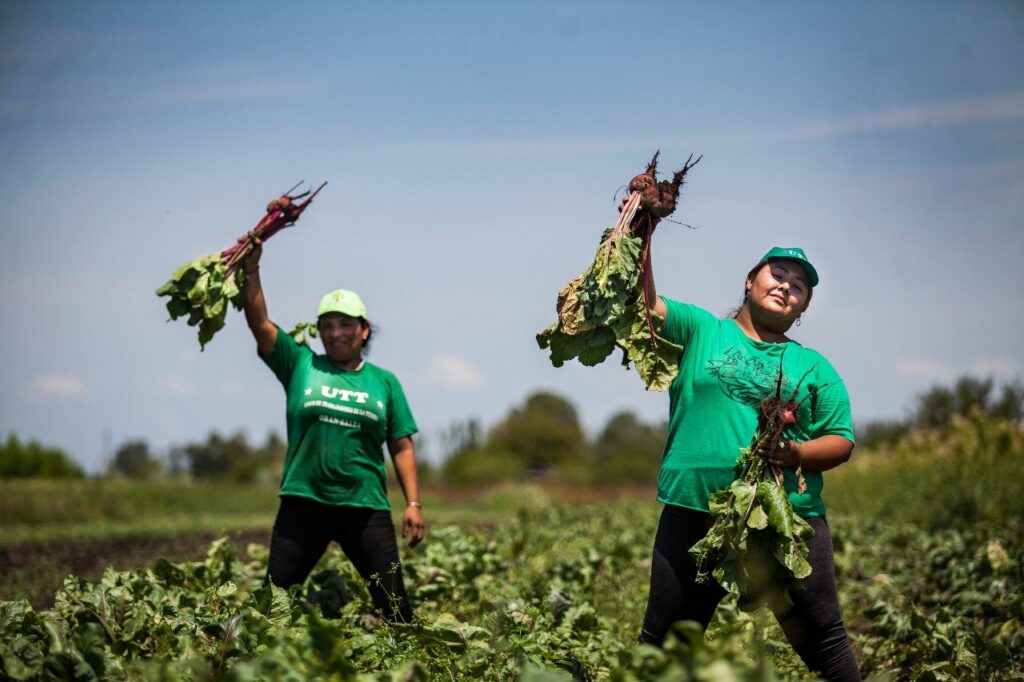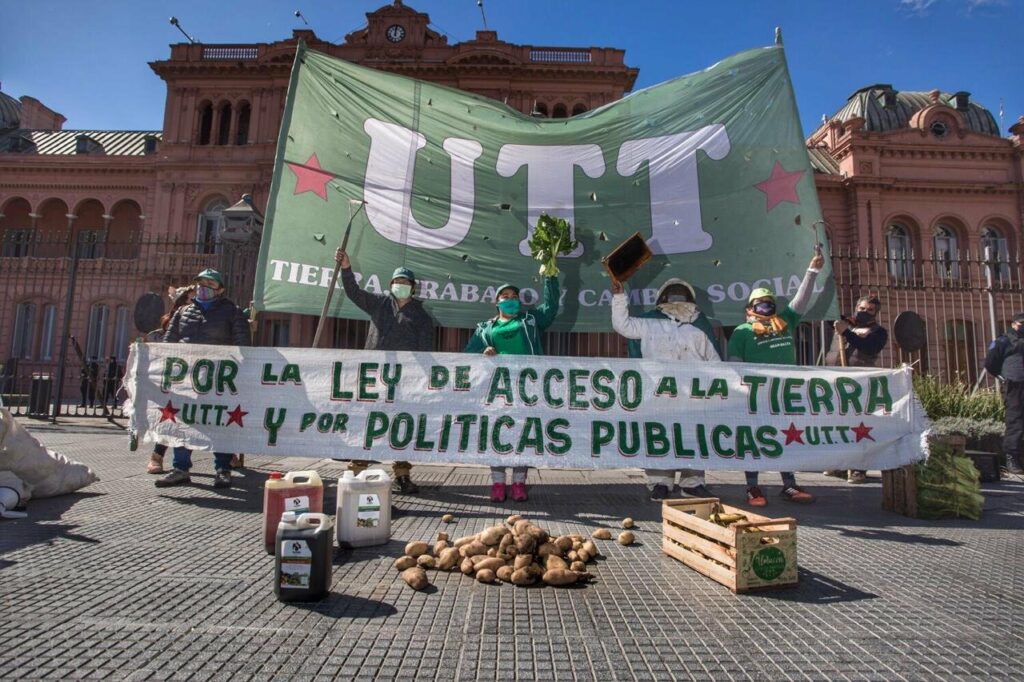We, the people, leave our footprint in history by means of our organizations and the popular power we build. The Union of Land Workers (Unión de Trabajadores de la Tierra, UTT) is one such organization, comprising 16,000 families producing food for local consumption in Argentina.
In Argentina, family agriculture produces more than 70% of the nation’s yerba mate, more than half of the vegetables and citrus fruits, more than half of the poultry and pork, almost all the goat meat, more than a fifth of the beef, and about a third of the milk consumed by Argentineans, among other produce.
Yet, more than half of the families working the land are forced to rent the land they labor on. We work daily, we train ourselves so that our practices are better, healthy and more diversified, and yet we live impoverished, without the right to decent housing because we cannot build on the spaces we rent.


In fact, the 2018 Agricultural Census revealed that big agribusinesses represented 1.08% of the total number of farms in the country, but they owned 36.4% of the land! Agribusinesses promise food for the world based on the application of agrochemicals — we call them agro-toxins — associated with genetically modified seeds. (The most emblematic case of this model is the large-scale production of GM soybeans; after Argentina opened its borders to Monsanto’s soybeans in 1996, it is now the third largest exporter of soy and is estimated to be the country with the largest use of glyphosate in the world, despite the fact that the World Health Organization designates this herbicide as probably carcinogenic). In 2019, an official report showed that 60% of the fruits and vegetables arriving at the Central Market of Buenos Aires contained residues of pesticides, herbicides and fungicides at non-permitted levels.
We live under a capitalist system; most of the land is controlled by a few, leaving many impoverished and poisoned. Systemic hunger has forced us to accept products that are not food, in order to survive. In this scenario, the social forces that fight for a dignified life are indispensable: peasants, farmers, popular and environmental actors that propose alternative models that protect the land, water and territories and pursue food sovereignty as a form of social justice to build a better future.
Food sovereignty in these latitudes translates to public companies and food production cooperatives, agroecological colonies, fair access to land, peasants owning their technology, fair and direct trade between producers and consumers, patent-free seeds, protection of biodiversity, healthy and safe food for all people, and gender equality in production and commercial decision-making. We, as workers of the land, promote these changes that we dream of with concrete actions:
- Recently, we have formally proposed the Law of Access to Land, which recommends the creation of a line of soft credits so that we can buy the land we work on. This would allow us to expand the scale of our production and implement processes of recovery and regeneration of the soil in a sustained manner. In this way, we could improve living conditions and the quality of food for the people across Argentina.
- We also promote the creation of Integral Agroecological Colonies for Urban Supply as a strategy to access community land, and to generate productive networks to supply towns with healthy and fresh local produce, promoting a more efficient, economic and sustainable distribution chain. The Colonia “20 de abril Darío Santillán” located in Jáuregui, Luján, is an example.
- Likewise, through the famous “verdurazos”, we wield the flag of food sovereignty with an innovative form of peaceful protest that conveys our message to urban people. Through the verdurazos we donate thousands of kilos of vegetables to vulnerable populations at public spaces, sometimes as a gesture of solidarity, other times to demonstrate the absence of public policies for small producers at a time of great socio-ecological crisis.
- Every day we promote the construction of training tools that play a central role in strengthening agroecology and productive planning. To this end, we created the Popular Technical Consulting room (Co.Te.Po), a system of horizontal transfer of technical knowledge of local and cultural relevance, highlighting successful experiences of agroecological transitions, enriching our resources to promote empowerment, organizing, and gender equity in productive and commercial decision-making.

We understand ourselves to be part of nature and we aim to break the fallacious division between nature and human societies. We propose an agroecological reconstruction of the territories we inhabit on which we can pursue liveable lives, with our own land, decent housing, and with greater levels of equality.
With our heads and hearts set on building a decent present and a better future from the ground up, we create alternatives, hand-in-hand with agroecology and fair trade. We prioritize access to healthy and nutritious food over profit. Our cooperative market arrangement is based on the premise that both producers and consumers pay fair and ethical prices.
We are proud to produce food in harmony with the soils, the waters, the air, the seeds and our bodies. This is our revolutionary praxis; it is the route that leads us down the path of transformation and socio-environmental justice. In every bite of agroecologically produced food, you can taste fragments of a diverse, popular, ecological and feminist revolution.
This contribution was lightly edited for length and clarity.
About the Author: Andrea P. Sosa Varrotti is a Postdoctoral Researcher of the National Scientific and Technical Research Council (CONICET) at the Interdisciplinary School of High Social Studies, National University of San Martin (IDAES-UNSAM), Argentina; a Lecturer at Universidad de Buenos Aires and consultant for the Ministry of Environment and Sustainable Development. She is a member of the Land Workers Union (Unión de Trabajadores de la Tierra, UTT) and the Collective of Agrarian Scholar-Activists from the South (CASAS). She specializes in the financialization of agriculture, land grabbing, entrepreneurial practices and discourses, and business models. Her research is currently focused on agroecological transitions and food sovereignty.
